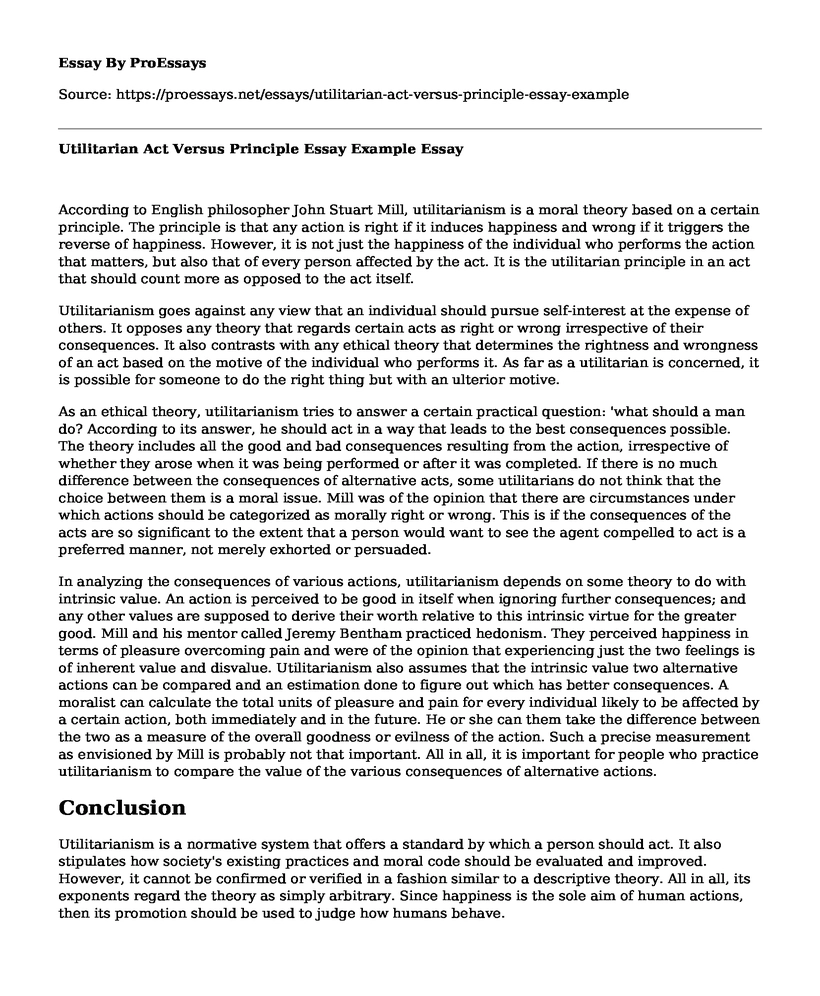According to English philosopher John Stuart Mill, utilitarianism is a moral theory based on a certain principle. The principle is that any action is right if it induces happiness and wrong if it triggers the reverse of happiness. However, it is not just the happiness of the individual who performs the action that matters, but also that of every person affected by the act. It is the utilitarian principle in an act that should count more as opposed to the act itself.
Utilitarianism goes against any view that an individual should pursue self-interest at the expense of others. It opposes any theory that regards certain acts as right or wrong irrespective of their consequences. It also contrasts with any ethical theory that determines the rightness and wrongness of an act based on the motive of the individual who performs it. As far as a utilitarian is concerned, it is possible for someone to do the right thing but with an ulterior motive.
As an ethical theory, utilitarianism tries to answer a certain practical question: 'what should a man do? According to its answer, he should act in a way that leads to the best consequences possible. The theory includes all the good and bad consequences resulting from the action, irrespective of whether they arose when it was being performed or after it was completed. If there is no much difference between the consequences of alternative acts, some utilitarians do not think that the choice between them is a moral issue. Mill was of the opinion that there are circumstances under which actions should be categorized as morally right or wrong. This is if the consequences of the acts are so significant to the extent that a person would want to see the agent compelled to act is a preferred manner, not merely exhorted or persuaded.
In analyzing the consequences of various actions, utilitarianism depends on some theory to do with intrinsic value. An action is perceived to be good in itself when ignoring further consequences; and any other values are supposed to derive their worth relative to this intrinsic virtue for the greater good. Mill and his mentor called Jeremy Bentham practiced hedonism. They perceived happiness in terms of pleasure overcoming pain and were of the opinion that experiencing just the two feelings is of inherent value and disvalue. Utilitarianism also assumes that the intrinsic value two alternative actions can be compared and an estimation done to figure out which has better consequences. A moralist can calculate the total units of pleasure and pain for every individual likely to be affected by a certain action, both immediately and in the future. He or she can them take the difference between the two as a measure of the overall goodness or evilness of the action. Such a precise measurement as envisioned by Mill is probably not that important. All in all, it is important for people who practice utilitarianism to compare the value of the various consequences of alternative actions.
Conclusion
Utilitarianism is a normative system that offers a standard by which a person should act. It also stipulates how society's existing practices and moral code should be evaluated and improved. However, it cannot be confirmed or verified in a fashion similar to a descriptive theory. All in all, its exponents regard the theory as simply arbitrary. Since happiness is the sole aim of human actions, then its promotion should be used to judge how humans behave.
References
Mill, J. S. (2015). On Liberty, Utilitarianism, and other essays. Oxford University Press, USA.
Cite this page
Utilitarian Act Versus Principle Essay Example. (2022, Jul 20). Retrieved from https://proessays.net/essays/utilitarian-act-versus-principle-essay-example
If you are the original author of this essay and no longer wish to have it published on the ProEssays website, please click below to request its removal:
- Why Is It Important for Instructors and Leaders to Be Ethically Sound - Essay Sample
- Personal Reflection on Values and Ethics
- The Concept of Free Will and Determinism - Essay Sample
- Essay Example on Personal Values, Relation & Professional Ethics: Impact on Social Work
- Personal Values Essay Example
- Essay Example on Magnimum: The Sweetest Yet Most Dangerous Person to Ever Exist
- Paper Sample on Socrates and Meno Debate Virtue: Is It Teachable?







